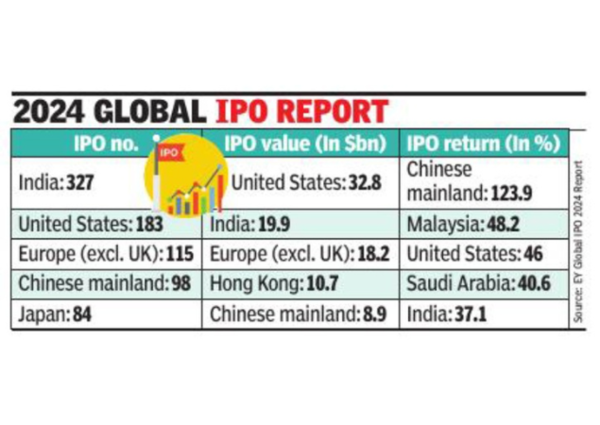BENGALURU: Investors are finding India an attractive destination for startup IPOs, showing signs of resilience, especially when markets elsewhere remain subdued. “The Indian business landscape has transformed significantly, primarily due to the active IPO market. This shift is influencing founder behaviour, compelling them to focus on positive unit economics, profitability, and growth. The key measure of entrepreneurial success now lies in the ability to list companies and consistently meet public market expectations. With mutual funds and institutional investors showing keen interest in profitable, tech-based VC-backed listings, global investors are viewing India as an attractive IPO market,” said Shekhar Kirani, partner at Accel.
With 13 startups listing on the bourse last year, that number is expected to increase, with an additional 25 gearing up for an IPO this year. Its portfolio firms, including foodtech platform Swiggy, listed in November, while jewellery retailer Bluestone has submitted its draft red herring prospectus for an IPO.

Last year, India achieved a significant milestone by securing the top position worldwide in IPO volume, surpassing both the United States and European markets substantially. According to an EY report, Indian markets witnessed 330 companies going public, generating $19.9 billion in capital. The performance represents a 36% increase in the number of IPOs and a 150% growth in funds raised compared to 2023. This growth was driven by India’s strong domestic economic expansion, advantageous geopolitical conditions, and considerable foreign capital inflows, establishing the country as the leading destination for IPO activities last year.
Recently, Accel secured $650 million for its eighth India-focused fund, as shown in the US Securities and Exchange Commission (SEC) filings. As the first institutional investor in 80% of its portfolio companies, Accel has prominent startups, including Freshworks, BrowserStack, Urban Company, and Zetwerk in its portfolio.
Kirani said that by the end of the eighth fund, Accel said the money would be deployed into 50-60 companies. “Our goal is to get at least high-quality 40 Series A quality companies investing anywhere between $12 million to $15 million per company,” he said. The fund would be deployed into startups focused on manufacturing—India to global (startups catering to global demand for diversified supply chains), India-native (startups focused on IP-driven, value-added manufacturing), firms at the intersection of services and tech and Industry 5.0. “We aim to identify founders in Bharat who can tap into the existing consumption market worth over $500 billion. The potential for revenue generation is substantial in this segment. These consumers demand service excellence comparable to urban standards and seek experiences like those available in cities. The challenge lies in delivering such services effectively,” Kirani said.
Many investors are betting big on India’s manufacturing story. “We are seeing this in many of the manufacturing companies, asset-light companies from India going global, and we continue to look for unique IP manufacturing companies in India which are servicing first as import substitution. Can I substitute first in India? Once I do, can I go global?” he added.
Analysing the purchasing patterns of India’s leading 100-200 corporations, including Flipkart, Freshworks, and Swiggy, reveals their procurement approaches are as refined as any international firms. “By developing solutions targeting these 200 companies whilst maintaining global scalability, one can establish world-class enterprises from India. This trend is becoming increasingly evident. We have invested in approximately 6 to 7 companies following this model, where initial sales target these 200 organisations,” Kirani said.






